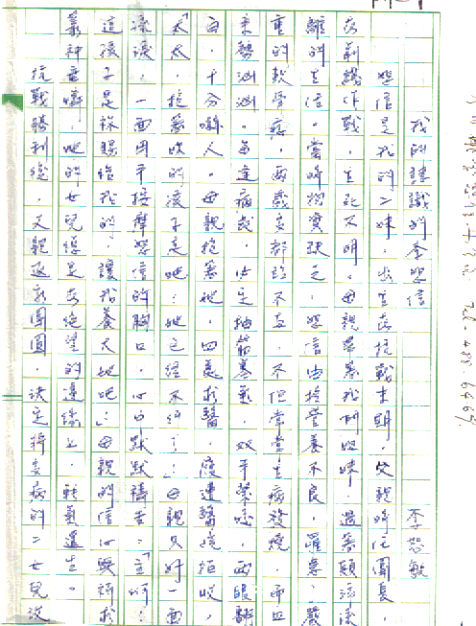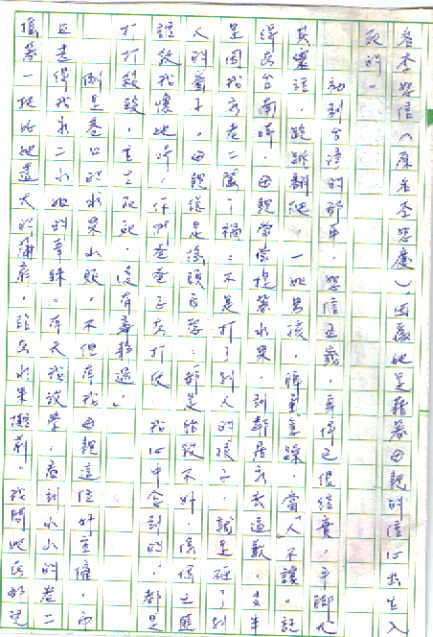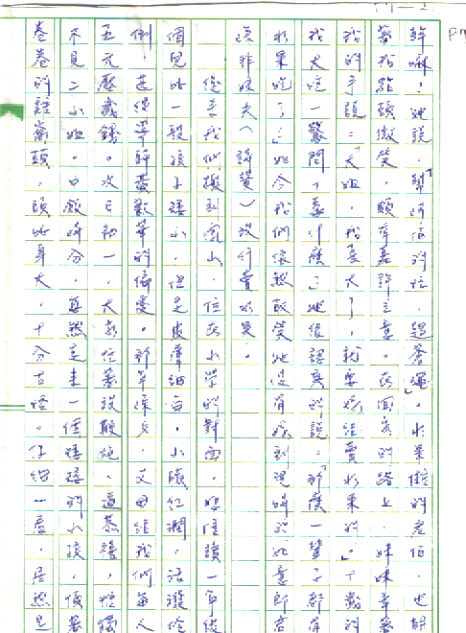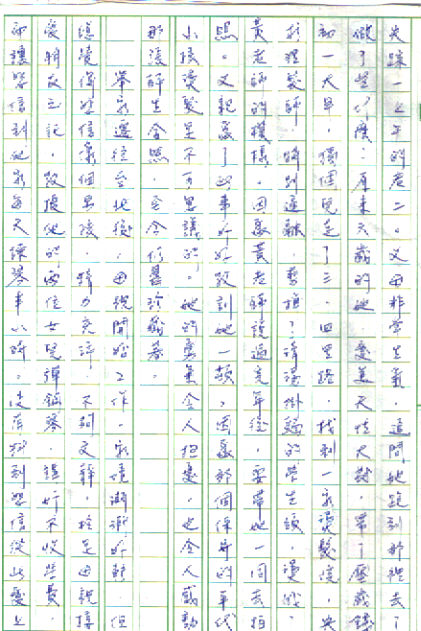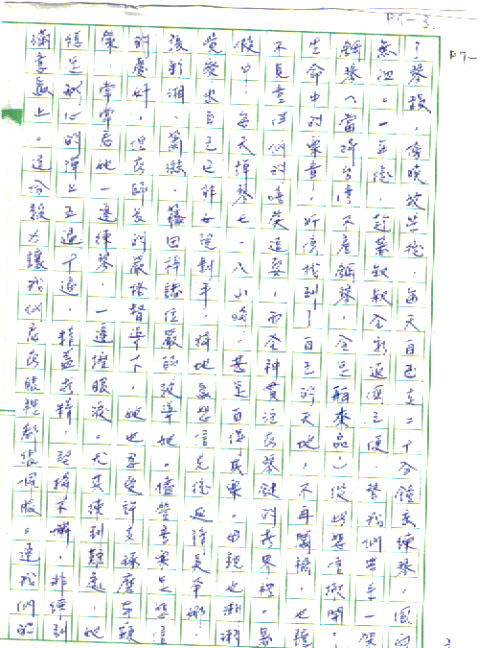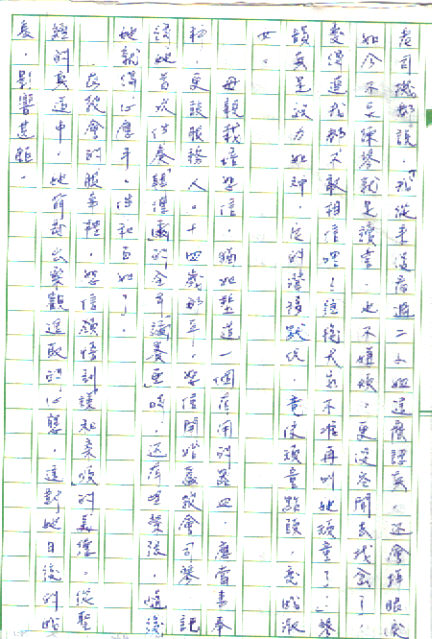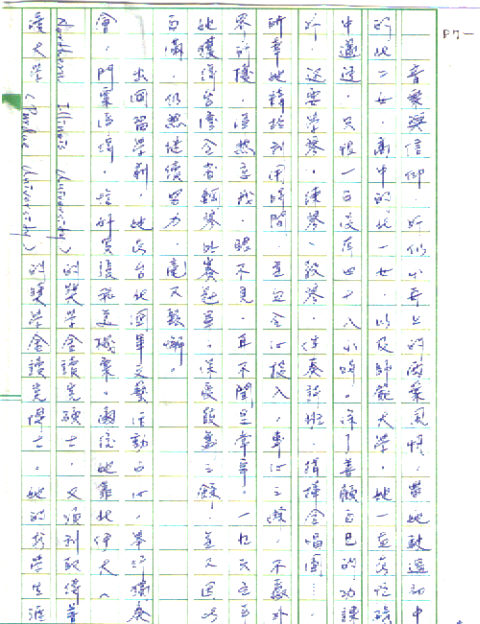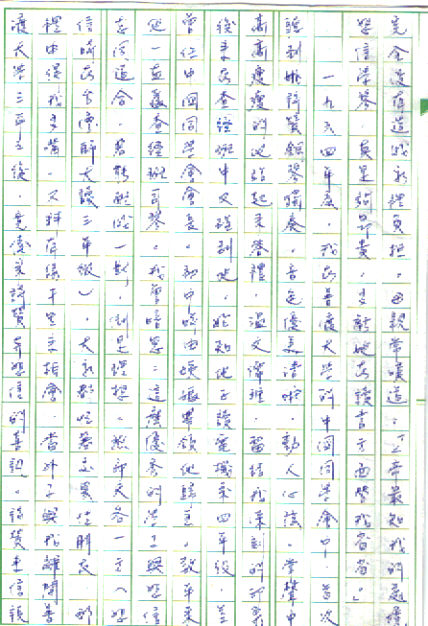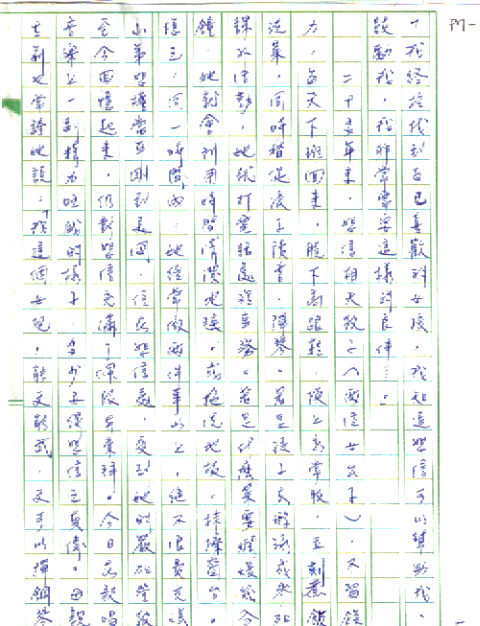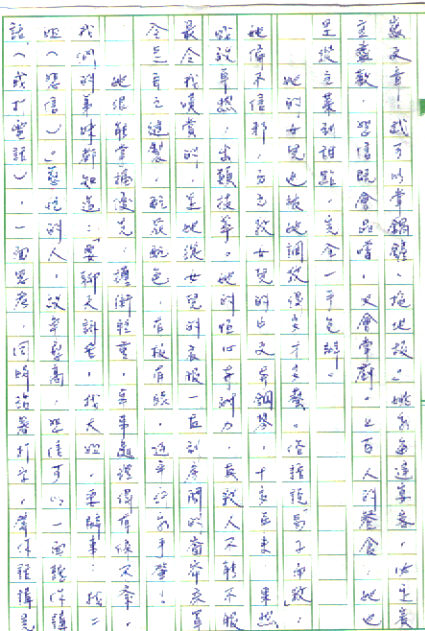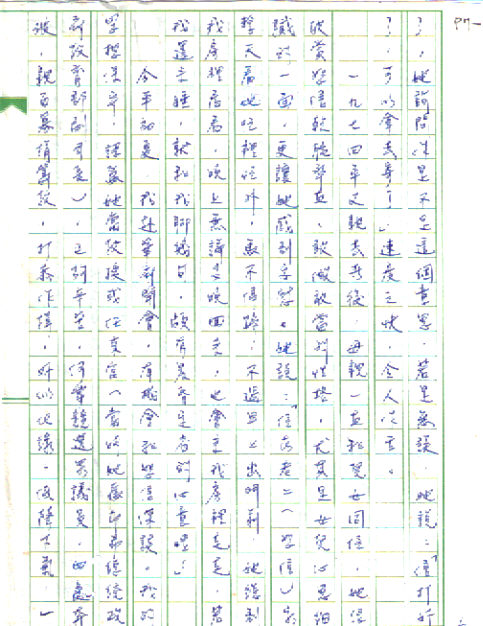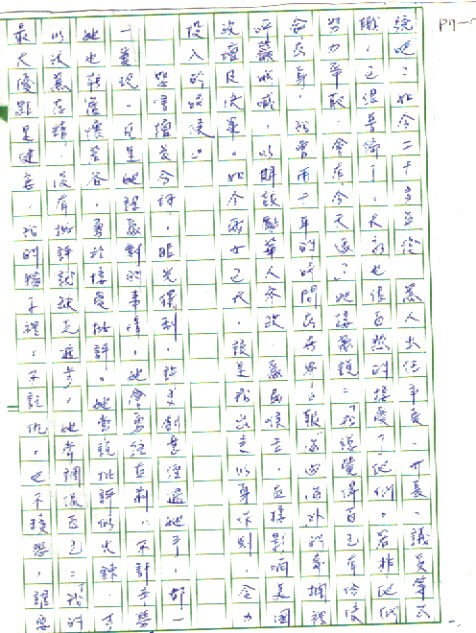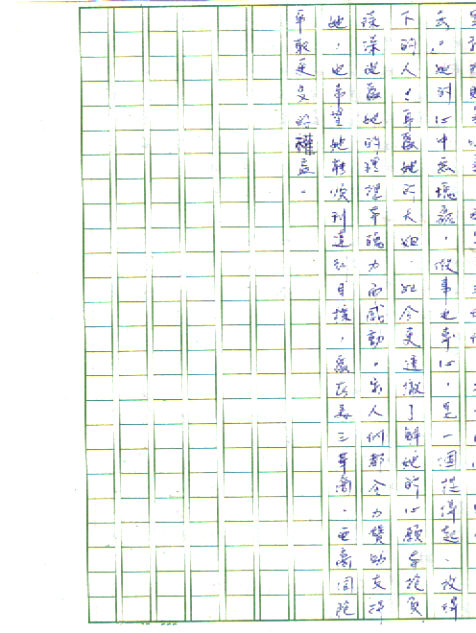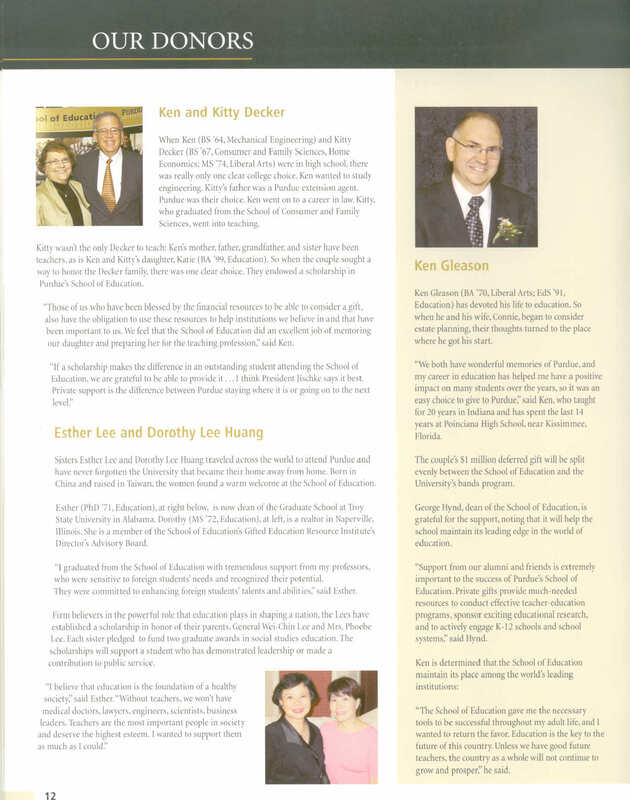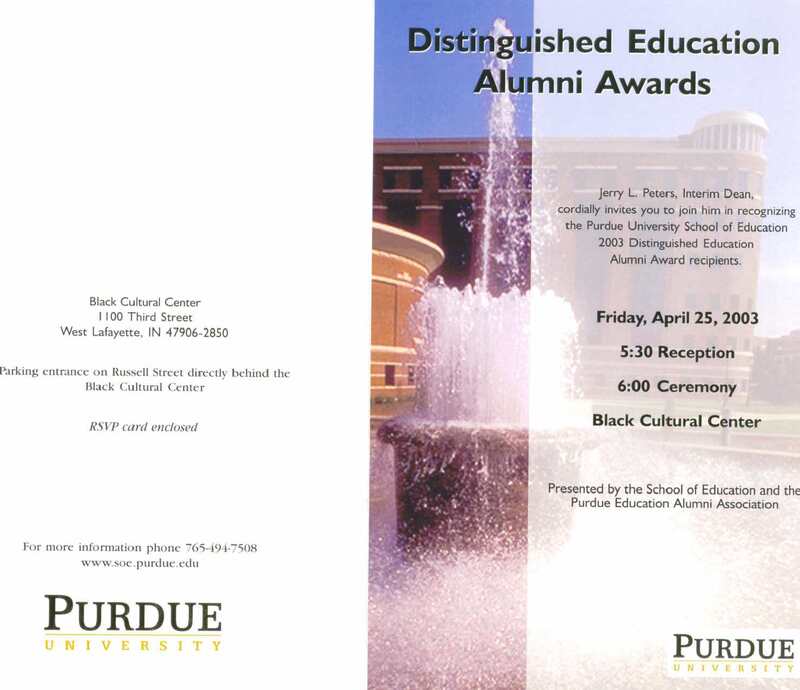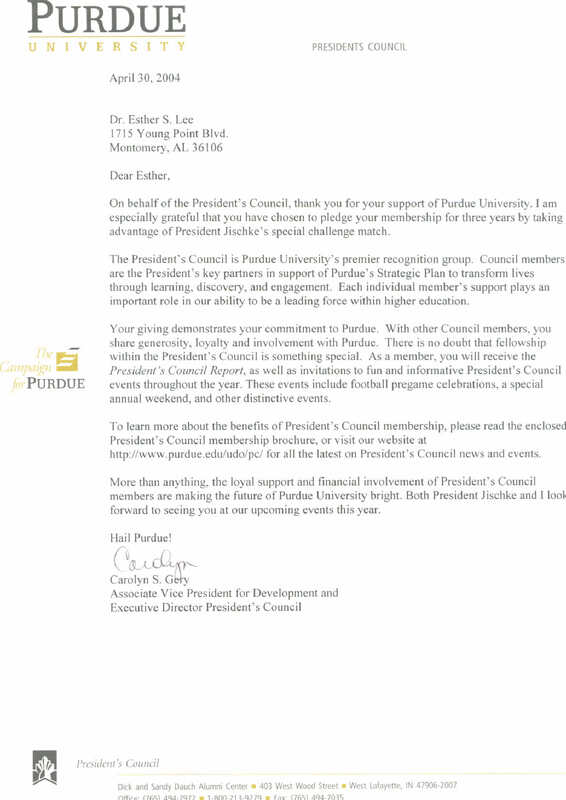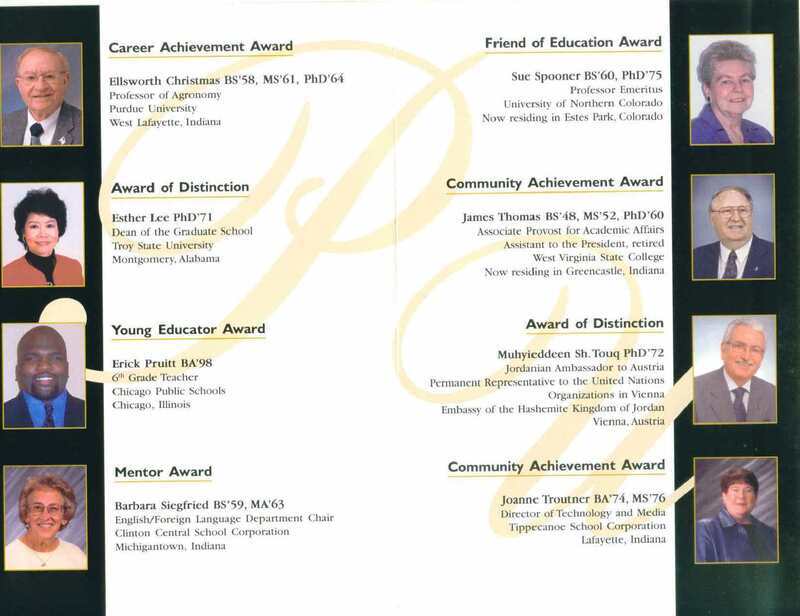The Esther Lee That I Know by Shu-min Hsieh
| sistershuminhsiehswritingaboutestherp1b.jpg | |
| File Size: | 103 kb |
| File Type: | jpg |
|
This article was written by Esther Lee’s older sister, Shu-min Hsieh for Esther’s 1992 Congressional campaign. Possibly at the request of news media or for press release. Translated by Mary M. Lin of Orlando, FL in Nov. 2012.
The Esther Lee That I Know by Shu-min Hsieh Esther is my second younger sister, born near the end of the war of resistance against Japanese aggression. At the time, Father was the leader of his unit and fighting on the front lines, his fate was uncertain. As a result, Mother and the two of us wandered from place to place. Because of was poverty Esther came down with a serious case of rickets/calcium deficiency as a result of malnutrition. She couldn't stand straight even at two years old, and not only was she often feverish, but it was quite severe. Every time the symptoms hit, she would seize up, have difficulty breathing, her hands clutched into fists and her eyes rolled into her head--a terrifying sight. Mother took her to see every doctor she could, but all the hospitals refused to take her in. "Lady, just go home! She's not going to make it!" With tears in her eyes, Mother would massage Esther's chest and pray: "Lord, you've given me this child, let me raise her!" Mother's faith and prayer were granted by God, as Esther would always come back from the edge of despair. After the war was won, Father came home to reunite with us, and decided to rename Esther from Lee Shu Qing to Lee Shu Xin, because she escaped the clutches of death through my mother's faith. The first year we arrived in Taiwan, Esther was 5 years old, and already sturdy. Her limbs were especially dexterous, running and jumping around like a boy, and short tempered besides. I remember when we lived in Tainan, Mother would often take fruit over to the neighbors to apologize, mostly because Esther got into trouble: she'd hit someone else's children, or broke a window. Mother would shake her head: "I didn't provide her with a good environment for her during the war, and now she's like a little bandit. When I was pregnant with her, your father was at war, and all I could think of was about fighting, killing, and death; we didn't have a moment of peace." The fruit vendor at the end of the alley didn't just have my mother as his best customer, but even my sister’s “admiration.” One day on my way home from school, I saw her waving a fan bigger than she was, standing over the vendor. When I asked her what she was doing, she answered: "Helping Uncle gets the flies away." The vendor nodded at me, smiling, as if he approved of this. On the way home, Esther held onto my hand and said: "Sis, when I grow up, I want to marry a fruit vendor." Then as a teenager, I was very surprised: "Why?" She said very seriously: "That way I’d have fruit to eat for the rest of my life!" Even today we still joke that she has yet to marry the man of her dreams, unless her husband changed jobs. Later, we moved to Feng Shan, living in front of the elementary school. As a first grader, Esther was the favorite student of her teacher Huang Huan Hua. On the New Year's Eve of that year, our parents gave each of us 5 dollars of lucky money for the holiday. The next day, everyone was busy setting off fireworks and wishing each other a happy New Year—except Esther was missing. At noon, all of a sudden we saw a short child with a head full of curly hair that made it look bigger than her body, a strange sight indeed. Upon closer inspection, we realized that it was the missing Esther. Mom and Dad, very angry, ran up to her to ask where she'd gone and what she'd done. At six years old, she took her money to the hair stylist 3-4 miles away and begged for special consideration to have her hair cut and perm from its original student look style in order to look as her teacher's, simply because her teacher had told her that they would take a picture together after New Years' festivities were over. Father gave her quite a lecture for this, because in that conservative era, it was unthinkable for a child to get her hair in a perm without parental consent. Her courage was both worrying and encouraging. That picture taken with her teacher is still treasured to this day. After our family moved to Taipei, mother began to work, and our home situation gradually began to improve, but Esther always seemed boyish: full of energy and not placid enough. So Mother offered a friend to give her two daughters piano lessons in exchange for Mother and Esther to practice an hour in their house daily. Unexpectedly, Esther fell in love with music from then on. Every evening after school, she walked the twenty-minute route to practice regardless of weather. One year later, when our diplomat uncle's whole family came back from South Africa, he brought a piano for us. (At that time Taiwan didn't produce any pianos, and had to import them). From there Esther began her journey in music, as if finding her own paradise. No longer did she get into trouble, nor did we hear the youthful laughter and teasing any more. She focused all of her energy into the world of keyboard. During summer vacations, she was happy to practice 7-8 hours every day. Mother soon realized that she wasn't a match for her daughter, and asked Ms. Hu Han Na, later Professors Zhang Cai Xiang, and Dr. Robert Shultz and other famous teachers to lead her. Though Esther loved music, she also endured a lot of polishing and discipline under the harsh tutelage of her teachers. I often saw her wiping her tears as she practiced, especially when she got into a difficult portion. She would always practice it many times, determined to get it exactly right until she was happy with the result. We all admired that kind of willpower. Even our old driver said: "I've never seen Esther so serious about anything, even becoming teary eyed.” Now, if she does not practice the piano, she’d read, and has no time to make trouble. Even I can't believe she's changed so much! From now on, no-one should call her “naughty child!" Music truly has divine properties. It can subtly change even the most stubborn child into a lady. Mother cultivated Esther like she was making a useful vessel both to serve God and other people. Starting at the age of 14, Esther began playing piano for the church. I remember when she first began accompanying Handel's Messiah, she was somewhat nervous, but eventually she was able to play as she pleased. In her service to the church, Esther learned the virtues of humility and submission. In light of the truth of the Bible, she developed an attitude of optimism and enterprising; this became a great influence for her further growth. Music and faith became like two sails for her, leading her into Taipei Second Girls' School for middle school, Taipei First Girl's High School for high school, and the National Taiwan Normal University. She continued pressing on her education and music endeavor, wishing that she could have 48 hours in a day. In addition to her own homework, she had to take piano lessons and practice a lot. Meanwhile, she gave piano lessons to young people and accompanied the choir, direct the choir . . . Fortunately, she was skillful in time management and devoted herself wholeheartedly into every endeavor. When focusing on one task, she would completely tune out the rest of the world and care nothing else. In 1965 she won the all-Taiwan piano competition. Encouraged, but not satisfied with this result, she continued to work hard with no signs of letting up. Before she left Taiwan for studying in the United States, she held a farewell concert at the Taipei National Army Cultural Center, and raised enough funds for her plane tickets to America. Then, she finished her Master’s degree at Northern Illinois University via a scholarship, and then received a fellowship from Perdue to finish her PhD. Since her education didn't cause any financial burden, mother was very grateful: "God knows my circumstances. It was very expensive for Esther to learn the piano, so she was able to save some on her schooling." At the end of 1964, I was able to hear Stanton Yao’s piano playing at a Purdue University's Chinese Student Association event. His music was beautiful, clearing, and touching. Among the applause I saw his tall, thin figure rise and bow; this air of polite civility left a deep impression on me. When I met him again during my Bible study, I learned that he was senior of studying Electrical Engineering, and had been the president of the Chinese Student Association. In middle school, his aunt led him to the Lord, and he had always been the pianist for his Bible study ever since. I thought to myself: this excellent scholar has similar life goals as Esther, and the two of them would make an ideal pair. At the time, they were in opposite corners of the word. (Esther was a freshman at National Taiwan Normal University at the time.) They both were busy meeting their own opposite-sex friends, so there is no need for me to intrude. I'd never thought that fate would bring the two of them together. To my surprise, I got the happy news that Stanton and Esther were wed one year after I and my husband left Purdue. In his letter, Stanton wrote: "I finally found a girl I like. I know that Esther can help me and encourage me, I need a companion like her . . . " In these twenty some years, Esther has served her husband and two daughters with everything she has. Every day when she gets home from work, she takes off her high heels, changes into casual clothes, and gets to cooking dinner, as well as watching over her children's studies and piano practice. If her children go swimming or other extra-curricular activities, she will take care of the chores over the phone instead. If some dish takes many minutes to be cooked, she'll use that time to clean the rug, or mop the floors and wipe the windows. She often does more than two things simultaneously and never wastes any time. When my little brother Shu Chuan first arrived at America, he lived at Esther's house and was under her strict discipline. Thinking back to those times, he is still full of respect and awe for her. Today, he sings and performs in such a spirited manner, one can see her influence on him. When she was still alive, Mother would also often praise her: "My daughter is a woman of many talents!" Indeed, she can play the piano, write essays, handle pots and pans, attend the gardens and wield a mop. Whenever their house has guests over, everyone has a good time, because Esther is a woman of such good taste and cooking skills. She even can single-handedly treat up to a hundred guests' worth of food from the main course to dessert. Her daughters have also been taught to have many talents as well. Although common wisdom is to never educate one's own children, she disregarded this belief and taught her daughters Chinese and piano. In these dozen or so years, the results have been outstanding and a cut above the rest. Her patience and perseverance is definitely something to be admired. What awes me the most is that she makes everything from her daughters' clothes to the drapes and bedspreads herself with such a sense of color and pattern that it looks like the work of a professional. She has an excellent grasp of priorities and has everything well-organized. All us siblings know: if we just want to talk or vent, go to big sis (me), but if we want something done, ask Esther. The busier she gets, the more efficient she becomes. Esther can listen to you (or talk on the phone), think, and type at the same time. Once you're done with talking, she'll confirm what you meant, and if she got it right, she'll say: "The letter's all type up, you can go mail it now!" She is so fast; it boggles the mind. After Father passed away in 1974, Mother always lived with her children. She admired Esther's simple straightforwardness and strong sense of responsibility. She was especially touched by her daughter's thoughtfulness. She said: "Living at Esther's house, I see her busy all day long without stop, but before she left the house, she would come to see me in my room. And at night, no matter how late she gets back, she comes into my room. If I haven't fallen asleep yet, she would stop by to chat. This must be her way of honoring the traditional custom of greeting me both in the morning and evening!" Early this summer, I went to Washington D.C for a conference, and I had a chance to have a long talk with Esther. Being more conservative, I felt that it was difficult enough for her to be a professor and a government official (at the time she was a deputy director of the Department of Education under President Bush [Sr.]. I didn't understand why she'd seek public office and run around raising campaign funds as if she was begging for money. She'd speak in such a low-key way that I as her big sister felt bad for her. On the other hand, she felt that she had a mission, and she'd have to be able to endure difficulty and look at the long-term goal with courage, not worry about her personal gains and losses or the short term outcome. During her appointment in Washington D.C., she witnessed many injustices and unreasonable behaviors, as well as much work that was yet to be done. She asked me: "How have Africans Americans changed in the past 20-30 years? Yet the Chinese Americans have merely been busy seeking after their own benefits and accomplishments with no concern for politics. In the past 160 years, the Chinese Americans went from unskilled labor (coolie) working on the railroads and digging in mines to being today's professors, doctors, and engineers, but only a scant few are in politics. Somebody has to be that vanguard to pave the road for our children and grandchildren. It may not be easy now, but someone has to blaze that trail in order to create a new paradigm. Think back to when we first came to America; it was unimaginable that we might see African-American mayors, governors, or even presidents. Yet, in those twenty years, it's very common to see African Americans in offices like mayor, governor, senator, or representative, and everyone has accepted that as the status quo. If it wasn't for them striving for this with all their strength, would they have such as scene as [it is] now?" She continued: "I feel that I have a mission. For the last ten years I've wrote columns in the World Journal calling and encouraging Asian Americans to join in politics and speak for their people, directly affecting American political dialogue and policy. Now that my daughters are grown, it's time for me to lead by example and throw myself into politics full-time." Esther takes the long view and has quite discerning eye. Many ideas have become a reality in her hands. If she thinks something is the right to do, she'll forge ahead courageously no matter how difficult it may be. She can also humbly accept criticism from others, thinking it to be like a forging fire, believing that one can actually backslide without it. She says of herself: "My best 'advantage' is that I'm forgetful, as I don't remember animosities or hold grudges. If someone wants to be mad at me, they're just making trouble for themselves, because I don't have time to be angry." Without that burden in her heart, she is a focused person who can be responsible, and yet let go at right time. Being her elder sister, now I understand her wish and aspiration. Moreover, I am truly touched by her ideas and strength of will. Her whole family supports her and also hopes that she can achieve her dream of winning more rights for her fellow Asian immigrants in the United States. Fall of 1991 |
|
| growth_of_a_beautiful_woman_in_chinese_newspaper.doc | |
| File Size: | 51 kb |
| File Type: | doc |
The Growth of a Beautiful Woman by Dorothy Lee Huang(written on the eve of Taiwan's Women's Day) in a Chinese newspaper
A lot of friends and readers have asked how my second sister Xu Xin and youngest brother Xu Quan are doing lately. As I got asked this again over the weekend in Chicago's Chinese New Year festival, [I felt that] this time I shouldn't put it off any longer and took out some time to take up my pen to write about a woman like us, who came from Taiwan, China, and is striving for her living in the States.
All those who know us siblings say we are blessed to have a wonderful mother who was so devout, wise, and full of warmth and love. Indeed, Mother's generosity, perseverance, and above-average self-esteem was indeed the best example for us. But it was Father's sense of responsibility, bravery in the face of death, daring, loyalty, patriotism, concern for others, and courage that molded someone whom I admire, my second sister, who was born in times of chaos, excelled in times of peace, and with nothing but her own two hands – playing the piano, glorified God and helped others in a foreign land.
Born in lean times as the war against occupation was ending, my sister managed to survive during her infancy, but suffered calcisum deficiency as a result of malnutrition. Though comely, she could never grow very tall. Nevertheless, her 5'2" figure did not restrict her ambition.
From Father my sister inherited his wit, daring, sense of humor (perhaps a surprise to you!), decisiveness, bilingual talent, and eloquence; from Mother her great wisdom, magnanimity (I've never heard her raise a fuss with anyone), musical talents, writing skills and creative aspirations.
Every day in elementary school she'd stand on stage directing the entire student body in singing the national anthem; she began playing piano for the church in middle school; in college, she organized the church children's choir; her whole life was spent walking with the Lord. In eighth grade, when hurricane flooding resulted in a power outage, she still lit candles in order to practice Handel's Messiah for church choir on the piano by herself.
Studying at Taipei's First Girls’ Middle School meant so much homework that she often fell asleep at her desk, but she continued to serve the Lord with music beyond being the pianist. Because of this, she developed the habit of making the best of her time, [becoming a person] of few words, not idly chit-chatting, but instead made every word count. In college, she was the champion of Taipei's and Taiwan's piano competitions despite not being a music major. In order to practice for her concerts, she would practice eight straight hours each day during the sweltering summer, not stopping unless a servant brought her food. Before leaving the country to advance her studies, she endured the agony of having a splinter and pus-filled wound in her thumb to finish a concert for the church. Then she went to have the surgery after the event. Because the thumb had swollen too much for the doctor to inject anesthesia, she had to bet the bullet and let the doctor operate on her [without it]. But she was willing to endure it so that the church could have its first name-brand piano.
In college, she was already on her way to being a “wealthy lady”, because she [not only] could teach piano, but once she won the city and national championships, her students increased along with her income. Every Sunday she wore a new dress and the newest hairstyle to church. She was even able to pay for her plane ticket to the U.S. herself, as well as take care of any other expenses and [also received] a scholarship from Northern Illinois University with her own hands. A year and a half later she had received a Master's degree and gotten married; another two and a half years later, she had received a Ph.D., gave birth to a healthy baby, and didn't let our parents worry about her one bit.
In order to be a good wife and mother, she stayed at home to serve her husband's stomach (food). When her two daughters were little, she stayed at home with them for four years, and established the first weekend Chinese school in Houston, beginning to write editorials and books as well. It wasn't until after [these] four years that she began to teach at University of Houston/Clear Lake.
Though she was obedient to our parents, she also had her own ideas and principles that she refused to compromise on even if she were disciplined for them. After our parents retired, she single-handedly took on the burden of bringing them to her home in Houston to live with her, taking care of Mom even after she became a widow.
To me, her younger sister, she'd told me before I came to the States, that she would wholeheartedly support me if I could pass the government's studying abroad exam. Indeed, she completely honored her commitment whether it was schoolwork, material needs, or mental ones. In 1970 when I disembarked from the plane, I almost couldn't recognize my own sister [though] she was standing right in front of me. She was no longer the center of attention in high fashion, but a simple young wife in twin braids, shirt and jeans, looking like a plain, ordinary student who showed nothing but respect for her husband. To me, this was a heartbreaking sight.
When I was appearing in Taiwan's television stations or other concerts, she was always unwilling to accompany me [on the piano]. But, to my great surprise, [once we came to] a foreign land, she supported me greatly, gladly being my pianist at church or other occasions. While leaving the country, all I wanted to do was hurry up and get my degree and then go back to Taiwan to teach, so I didn't put any thought to the way I dressed, so I only packed four new outfits and took care of my hair by simply tying a ribbon in it. On the night of the event for welcoming new students on Purdue campus, she saw that her little sister—who didn't even know how to dance—didn't have a suitable dress she immediately grabbed a rose red cloth and squeezed out an afternoon between her precious study hours to make, using a needle stitch by stitch as we were broke students and didn't have a sewing machine, a one-piece dress that was even hemmed with white silk blossoms. When my brother-in-law came to pick me up to the event, he saw that my hairstyle was too old-fashioned, so at once he told my sister to redo my hair in ten minutes.
In the year and a half she was at Purdue with me (a year and a half after I went there, she got her Ph.D. and went with her husband to Houston), she not only took care of my living arrangements, [such as] sharing the secrets of [successful] school work and taking me to Purdue's 24-hour computer building to get in line with hundreds of other students in order to use the computer. She also taught me how to make three large sandwiches at once to fill me up so that I can stay at the library and study 12 hours straight. She also taught me to make cakes and other western desserts, moon cakes, spring roll wrappers, rice cakes, and French desserts; and to cut coupons, to use American cleaners to tidy up the place, and buy our own cloth to sew outfits. Who knew that the young lady being doted upon by servants at home was able to adapt and become even more capable! She even taught me how to "be of one mind, making a meticulous plan, and running straight for the goal". When I was in my thirties, I read her articles in World’s Journal column on "Overseas Chinese”: “How to enter mainstream society", "How to run for office", "Becoming a modern woman" and heard one of her speeches in Silicon Valley, and being deeply affected [by her words], I began to learn how to strive for Asians' image and place [in society]. [It also became my hope] that the inheritance we leave to the next generation is "social status", and to be a respected ethnic group. In these thirty years, she's been my greatest example and consultant in my work and community service.
She also contributed her best to our two brothers, especially taking care of the youngest brother who came to the States at the tender age of 13, teaching him how to do his homework and to acclimate to his new surroundings. When my second sister was in middle and high schools, we would stand around the piano with her every winter and summer vacation, and she would sing and play [all sorts of songs] from hymns to Chinese folk songs to selected opera repertoires. This left behind many warm memories; to this day. Every time there's a family reunion, everyone still remembers to sing loudly!
To her friends, she was always saying encouraging things, and she'd assist anyone in need, or weak, or send off the departed, and bury them. In taking public often, she often helped her fellow people in need.
For her fellow Chinese, second sister would teach, write books and editorials, run the Chinese school, busy herself with Church, home, and [taking care of] children; and yet she doesn't forget to work to raise the social status of Chinese immigrants. Mother once told me that when second sister was preparing for a lecture and read how the Chinese immigrants in Indonesia were killed, looted, and forced to change their last names, she closed the book and wept bitterly.
When she was in her thirties and living in Houston, many Chinese and Vietnamese immigrants poured into the area and were occasionally causing misunderstandings and even conflicts with the other communities, she went out of her way driving long distance to the school for police officers and taught a class on "multi-cultural [understanding]" so that the officers can understand Asians better. Many years later, these students rose into high ranking positions, including becoming the second in command at the FBI, and helped many Asian Americans.
Her Chinese and Western culinary skills were all very impressive in the last forty years. She often hosted dinners and receptions for Houston mayors and members of Congress in her home. After dinner she'd even change into a long skirt and play a song to entertain the guests.
For the society [at large] and developing the minds of the next generation, she taught, wrote articles, published books, delivered speeches in various places, and educated brilliant minds. Even as a retiree now, she still continues to fund scholarships and accept invitations for lectures. In the last three months alone she went to multiple colleges in Beijing, Chongqing, Chengdu, Shanghai and other cities.
Second sister is [the kind of person] who when in the kitchen wearing an apron and having a utensil in her hand she is a chef of Eastern and Western cuisines. She can turn a house into a palace with a broom without any help and even made the cover of an American lake living magazine. Standing behind a lectern, she can dance with a piece of chalk, make clever turns of phrase, and fill any hall with laughter; when performing, she can move people into tears; seated in front of a sewing machine, she can create miracles out of scraps of cloth, can make draperies and even bridal gowns out of white ribbons (as a graduate student without money, she made her own bridal gown and headdress); crouched in the yard she can transform wastelands to vegetable gardens and rosebushes. When times became tumultuous, she courageously took in our retired parents to live with her. In these last decades, I've never seen her waste her time, or bear a grudge or be narrow-minded. Because she often dared to try [new things], she also met more setbacks than most, but she never felt sorry for herself, instead running straight for the goal with single-minded determination. She always busied herself for her family, husband, daughters, church, writing, work, community, and to help others. Both of her daughters also had extraordinary education and career accomplishments. She had both the elegance of a woman and the daring of a man. She had [both] laughter and tears; sorrows and joys; successes and failure; serious and lighthearted [moments]; logic and emotion. Behind the figure that rushed in and out day after day was a heart full of courage and warmth. Every time I needed someone to discuss things with, I could make one phone call [to her] and she could grasp the point and make a succinct suggestion or plan in three to five minutes.
In the last thirty or so years she has published Chinese and English books which were then collected into the Library of Congress, produced the "Interactive Parenting" video series, wrote Chinese and English editorials [for multiple papers] including the World Journal, was appointed to several important positions by several governors and the Presidents, received multiple awards from the community and colleges, and visited fifty plus foreign nations and received dozens of foreign heads of state while representing the United States government and Congress. In the last fewscore of years, she's also worked tirelessly to help Chinese through difficult times and raise their standing in America. In 1992, she became the first Asian-American woman to run for Congress in Texas, leading the way for other Chinese.
And yet after nearly thirty years of marriage, her husband couldn’t understand that she was burnt out after resigning from her presidential appointments as the deputy director of the US Department of Education as well as the board member of the Fulbright Scholarship program. Then the husband who once called her "99% woman" came to the end of his rope. Divorce was against her religious beliefs, and the cold reality caused her great heartbreak. Nevertheless, God's grace was sufficient for her. He prepared a professorship for her at the University of Southern Arkansas. Without tiring housework, and her children being grown, she could all the more focus on her career without distractions. In a few short years, as she wrote books and articles, she rose again to being the department head and dean of the graduate school in an ever better college. I remember when she first came to Indiana to be the department head, though she no longer lived in a big house, she decorated her little apartment to be refined and welcoming. She even excitedly mailed me fruit- and flower-flavored teas, fruit cakes filled with rich ingredients, all-cotton sheets, sharing with me the joy of indulging herself. As a Dean of the Graduate School at the Troy University Montgomery, she turned her little yard into a luxuriant garden.
From her divorce in 1998 to her remarriage in 2005, I saw how she picked herself up from a great fall, but she never blamed God or others, but continually reflected on hers praying, and holding tightly onto the Heavenly Father's hand, walking with Him. She often thinks that if she hadn't lost her marriage, then she couldn't have focused her all on her career advancement. It was also in those seven or eight years, my husband was sent by [his company,] a top company in the States, to Hong Kong and Beijing, but because of my work and my children's schooling I stayed in America. [Now that] I knew the difficulty of being a single parent, and seeing the sorrow my sister endured, I became more understanding and caring of my friends who had also suffered a similar loss. I [began to] think of ways to invite them to my house as guests, out to dinner, or to participate in social events, [as well as] introduce them to new people, hoping that they could find happiness again. Sometimes, to my embarrassment, they wouldn't show up, but other times, I was able to see two people successfully come together, and I truly thank God for them.
I was [also] able to witness my sister marry again and be doted on by her [second] husband, watching them drive all over America in a large recreational vehicle, driving a motorboat or fishing on the lake in their large backyard, singing songs by the piano at home, and reading the Bible and praying together. I saw the brilliant glow of her golden years at last! I thanked God from the bottom of my heart on her behalf.
As a child, she learned how to "Living for Jesus" and "Walk with the Lord", remembering [to live her life like that hymn]: "Have Thy own Way, Lord, Thou art the potter, I am the clay, mold me and make me to live Thy will".
From her, I learned to look at the big picture, to make plans, to have faith, to be focused, to be responsible, to have courage, to make every moment count, and to have a sense of responsibility and mission for my people.
From her I also saw many roles: wife, mother, daughter-in-law, daughter, professional woman, chef, tailor, gardener…
Now, second sister has retired, written a living will, and arranged for a donation to go to a scholarship at her alma mater after her death. She [remains active], putting on a long skirt to hold a concert, changing into shorts to clean up the house, or a pair of shoes to go dancing, or a hat to go flying a plane. A moment later, she can prepare a table full of all sorts of dishes, to the amazement of her guests; and in a suit, she's holding lectures all over the world. Of all the people I know, she is the most optimistic, brave, talented, efficient, versatile, and patient. Her small frame has lived out a full and meaningful life, living up to the name mother gave her: Queen Esther, the brave and smart Jewish Queen of Persia who also loved her people.
Second sister has been wholly faithful to God, dutiful to our parents, loving to us siblings, considerate to her friends and people, and responsible to society and the molding of new talent. It is our hope that when we finish our journey of life, we can stand before our Lord in Heaven and boldly say: "We have run the race and kept the faith, let us come home and rest!"
Translated by Mary M. Lin of Orlando, FL
(As of 6/21/2012)
A lot of friends and readers have asked how my second sister Xu Xin and youngest brother Xu Quan are doing lately. As I got asked this again over the weekend in Chicago's Chinese New Year festival, [I felt that] this time I shouldn't put it off any longer and took out some time to take up my pen to write about a woman like us, who came from Taiwan, China, and is striving for her living in the States.
All those who know us siblings say we are blessed to have a wonderful mother who was so devout, wise, and full of warmth and love. Indeed, Mother's generosity, perseverance, and above-average self-esteem was indeed the best example for us. But it was Father's sense of responsibility, bravery in the face of death, daring, loyalty, patriotism, concern for others, and courage that molded someone whom I admire, my second sister, who was born in times of chaos, excelled in times of peace, and with nothing but her own two hands – playing the piano, glorified God and helped others in a foreign land.
Born in lean times as the war against occupation was ending, my sister managed to survive during her infancy, but suffered calcisum deficiency as a result of malnutrition. Though comely, she could never grow very tall. Nevertheless, her 5'2" figure did not restrict her ambition.
From Father my sister inherited his wit, daring, sense of humor (perhaps a surprise to you!), decisiveness, bilingual talent, and eloquence; from Mother her great wisdom, magnanimity (I've never heard her raise a fuss with anyone), musical talents, writing skills and creative aspirations.
Every day in elementary school she'd stand on stage directing the entire student body in singing the national anthem; she began playing piano for the church in middle school; in college, she organized the church children's choir; her whole life was spent walking with the Lord. In eighth grade, when hurricane flooding resulted in a power outage, she still lit candles in order to practice Handel's Messiah for church choir on the piano by herself.
Studying at Taipei's First Girls’ Middle School meant so much homework that she often fell asleep at her desk, but she continued to serve the Lord with music beyond being the pianist. Because of this, she developed the habit of making the best of her time, [becoming a person] of few words, not idly chit-chatting, but instead made every word count. In college, she was the champion of Taipei's and Taiwan's piano competitions despite not being a music major. In order to practice for her concerts, she would practice eight straight hours each day during the sweltering summer, not stopping unless a servant brought her food. Before leaving the country to advance her studies, she endured the agony of having a splinter and pus-filled wound in her thumb to finish a concert for the church. Then she went to have the surgery after the event. Because the thumb had swollen too much for the doctor to inject anesthesia, she had to bet the bullet and let the doctor operate on her [without it]. But she was willing to endure it so that the church could have its first name-brand piano.
In college, she was already on her way to being a “wealthy lady”, because she [not only] could teach piano, but once she won the city and national championships, her students increased along with her income. Every Sunday she wore a new dress and the newest hairstyle to church. She was even able to pay for her plane ticket to the U.S. herself, as well as take care of any other expenses and [also received] a scholarship from Northern Illinois University with her own hands. A year and a half later she had received a Master's degree and gotten married; another two and a half years later, she had received a Ph.D., gave birth to a healthy baby, and didn't let our parents worry about her one bit.
In order to be a good wife and mother, she stayed at home to serve her husband's stomach (food). When her two daughters were little, she stayed at home with them for four years, and established the first weekend Chinese school in Houston, beginning to write editorials and books as well. It wasn't until after [these] four years that she began to teach at University of Houston/Clear Lake.
Though she was obedient to our parents, she also had her own ideas and principles that she refused to compromise on even if she were disciplined for them. After our parents retired, she single-handedly took on the burden of bringing them to her home in Houston to live with her, taking care of Mom even after she became a widow.
To me, her younger sister, she'd told me before I came to the States, that she would wholeheartedly support me if I could pass the government's studying abroad exam. Indeed, she completely honored her commitment whether it was schoolwork, material needs, or mental ones. In 1970 when I disembarked from the plane, I almost couldn't recognize my own sister [though] she was standing right in front of me. She was no longer the center of attention in high fashion, but a simple young wife in twin braids, shirt and jeans, looking like a plain, ordinary student who showed nothing but respect for her husband. To me, this was a heartbreaking sight.
When I was appearing in Taiwan's television stations or other concerts, she was always unwilling to accompany me [on the piano]. But, to my great surprise, [once we came to] a foreign land, she supported me greatly, gladly being my pianist at church or other occasions. While leaving the country, all I wanted to do was hurry up and get my degree and then go back to Taiwan to teach, so I didn't put any thought to the way I dressed, so I only packed four new outfits and took care of my hair by simply tying a ribbon in it. On the night of the event for welcoming new students on Purdue campus, she saw that her little sister—who didn't even know how to dance—didn't have a suitable dress she immediately grabbed a rose red cloth and squeezed out an afternoon between her precious study hours to make, using a needle stitch by stitch as we were broke students and didn't have a sewing machine, a one-piece dress that was even hemmed with white silk blossoms. When my brother-in-law came to pick me up to the event, he saw that my hairstyle was too old-fashioned, so at once he told my sister to redo my hair in ten minutes.
In the year and a half she was at Purdue with me (a year and a half after I went there, she got her Ph.D. and went with her husband to Houston), she not only took care of my living arrangements, [such as] sharing the secrets of [successful] school work and taking me to Purdue's 24-hour computer building to get in line with hundreds of other students in order to use the computer. She also taught me how to make three large sandwiches at once to fill me up so that I can stay at the library and study 12 hours straight. She also taught me to make cakes and other western desserts, moon cakes, spring roll wrappers, rice cakes, and French desserts; and to cut coupons, to use American cleaners to tidy up the place, and buy our own cloth to sew outfits. Who knew that the young lady being doted upon by servants at home was able to adapt and become even more capable! She even taught me how to "be of one mind, making a meticulous plan, and running straight for the goal". When I was in my thirties, I read her articles in World’s Journal column on "Overseas Chinese”: “How to enter mainstream society", "How to run for office", "Becoming a modern woman" and heard one of her speeches in Silicon Valley, and being deeply affected [by her words], I began to learn how to strive for Asians' image and place [in society]. [It also became my hope] that the inheritance we leave to the next generation is "social status", and to be a respected ethnic group. In these thirty years, she's been my greatest example and consultant in my work and community service.
She also contributed her best to our two brothers, especially taking care of the youngest brother who came to the States at the tender age of 13, teaching him how to do his homework and to acclimate to his new surroundings. When my second sister was in middle and high schools, we would stand around the piano with her every winter and summer vacation, and she would sing and play [all sorts of songs] from hymns to Chinese folk songs to selected opera repertoires. This left behind many warm memories; to this day. Every time there's a family reunion, everyone still remembers to sing loudly!
To her friends, she was always saying encouraging things, and she'd assist anyone in need, or weak, or send off the departed, and bury them. In taking public often, she often helped her fellow people in need.
For her fellow Chinese, second sister would teach, write books and editorials, run the Chinese school, busy herself with Church, home, and [taking care of] children; and yet she doesn't forget to work to raise the social status of Chinese immigrants. Mother once told me that when second sister was preparing for a lecture and read how the Chinese immigrants in Indonesia were killed, looted, and forced to change their last names, she closed the book and wept bitterly.
When she was in her thirties and living in Houston, many Chinese and Vietnamese immigrants poured into the area and were occasionally causing misunderstandings and even conflicts with the other communities, she went out of her way driving long distance to the school for police officers and taught a class on "multi-cultural [understanding]" so that the officers can understand Asians better. Many years later, these students rose into high ranking positions, including becoming the second in command at the FBI, and helped many Asian Americans.
Her Chinese and Western culinary skills were all very impressive in the last forty years. She often hosted dinners and receptions for Houston mayors and members of Congress in her home. After dinner she'd even change into a long skirt and play a song to entertain the guests.
For the society [at large] and developing the minds of the next generation, she taught, wrote articles, published books, delivered speeches in various places, and educated brilliant minds. Even as a retiree now, she still continues to fund scholarships and accept invitations for lectures. In the last three months alone she went to multiple colleges in Beijing, Chongqing, Chengdu, Shanghai and other cities.
Second sister is [the kind of person] who when in the kitchen wearing an apron and having a utensil in her hand she is a chef of Eastern and Western cuisines. She can turn a house into a palace with a broom without any help and even made the cover of an American lake living magazine. Standing behind a lectern, she can dance with a piece of chalk, make clever turns of phrase, and fill any hall with laughter; when performing, she can move people into tears; seated in front of a sewing machine, she can create miracles out of scraps of cloth, can make draperies and even bridal gowns out of white ribbons (as a graduate student without money, she made her own bridal gown and headdress); crouched in the yard she can transform wastelands to vegetable gardens and rosebushes. When times became tumultuous, she courageously took in our retired parents to live with her. In these last decades, I've never seen her waste her time, or bear a grudge or be narrow-minded. Because she often dared to try [new things], she also met more setbacks than most, but she never felt sorry for herself, instead running straight for the goal with single-minded determination. She always busied herself for her family, husband, daughters, church, writing, work, community, and to help others. Both of her daughters also had extraordinary education and career accomplishments. She had both the elegance of a woman and the daring of a man. She had [both] laughter and tears; sorrows and joys; successes and failure; serious and lighthearted [moments]; logic and emotion. Behind the figure that rushed in and out day after day was a heart full of courage and warmth. Every time I needed someone to discuss things with, I could make one phone call [to her] and she could grasp the point and make a succinct suggestion or plan in three to five minutes.
In the last thirty or so years she has published Chinese and English books which were then collected into the Library of Congress, produced the "Interactive Parenting" video series, wrote Chinese and English editorials [for multiple papers] including the World Journal, was appointed to several important positions by several governors and the Presidents, received multiple awards from the community and colleges, and visited fifty plus foreign nations and received dozens of foreign heads of state while representing the United States government and Congress. In the last fewscore of years, she's also worked tirelessly to help Chinese through difficult times and raise their standing in America. In 1992, she became the first Asian-American woman to run for Congress in Texas, leading the way for other Chinese.
And yet after nearly thirty years of marriage, her husband couldn’t understand that she was burnt out after resigning from her presidential appointments as the deputy director of the US Department of Education as well as the board member of the Fulbright Scholarship program. Then the husband who once called her "99% woman" came to the end of his rope. Divorce was against her religious beliefs, and the cold reality caused her great heartbreak. Nevertheless, God's grace was sufficient for her. He prepared a professorship for her at the University of Southern Arkansas. Without tiring housework, and her children being grown, she could all the more focus on her career without distractions. In a few short years, as she wrote books and articles, she rose again to being the department head and dean of the graduate school in an ever better college. I remember when she first came to Indiana to be the department head, though she no longer lived in a big house, she decorated her little apartment to be refined and welcoming. She even excitedly mailed me fruit- and flower-flavored teas, fruit cakes filled with rich ingredients, all-cotton sheets, sharing with me the joy of indulging herself. As a Dean of the Graduate School at the Troy University Montgomery, she turned her little yard into a luxuriant garden.
From her divorce in 1998 to her remarriage in 2005, I saw how she picked herself up from a great fall, but she never blamed God or others, but continually reflected on hers praying, and holding tightly onto the Heavenly Father's hand, walking with Him. She often thinks that if she hadn't lost her marriage, then she couldn't have focused her all on her career advancement. It was also in those seven or eight years, my husband was sent by [his company,] a top company in the States, to Hong Kong and Beijing, but because of my work and my children's schooling I stayed in America. [Now that] I knew the difficulty of being a single parent, and seeing the sorrow my sister endured, I became more understanding and caring of my friends who had also suffered a similar loss. I [began to] think of ways to invite them to my house as guests, out to dinner, or to participate in social events, [as well as] introduce them to new people, hoping that they could find happiness again. Sometimes, to my embarrassment, they wouldn't show up, but other times, I was able to see two people successfully come together, and I truly thank God for them.
I was [also] able to witness my sister marry again and be doted on by her [second] husband, watching them drive all over America in a large recreational vehicle, driving a motorboat or fishing on the lake in their large backyard, singing songs by the piano at home, and reading the Bible and praying together. I saw the brilliant glow of her golden years at last! I thanked God from the bottom of my heart on her behalf.
As a child, she learned how to "Living for Jesus" and "Walk with the Lord", remembering [to live her life like that hymn]: "Have Thy own Way, Lord, Thou art the potter, I am the clay, mold me and make me to live Thy will".
From her, I learned to look at the big picture, to make plans, to have faith, to be focused, to be responsible, to have courage, to make every moment count, and to have a sense of responsibility and mission for my people.
From her I also saw many roles: wife, mother, daughter-in-law, daughter, professional woman, chef, tailor, gardener…
Now, second sister has retired, written a living will, and arranged for a donation to go to a scholarship at her alma mater after her death. She [remains active], putting on a long skirt to hold a concert, changing into shorts to clean up the house, or a pair of shoes to go dancing, or a hat to go flying a plane. A moment later, she can prepare a table full of all sorts of dishes, to the amazement of her guests; and in a suit, she's holding lectures all over the world. Of all the people I know, she is the most optimistic, brave, talented, efficient, versatile, and patient. Her small frame has lived out a full and meaningful life, living up to the name mother gave her: Queen Esther, the brave and smart Jewish Queen of Persia who also loved her people.
Second sister has been wholly faithful to God, dutiful to our parents, loving to us siblings, considerate to her friends and people, and responsible to society and the molding of new talent. It is our hope that when we finish our journey of life, we can stand before our Lord in Heaven and boldly say: "We have run the race and kept the faith, let us come home and rest!"
Translated by Mary M. Lin of Orlando, FL
(As of 6/21/2012)

